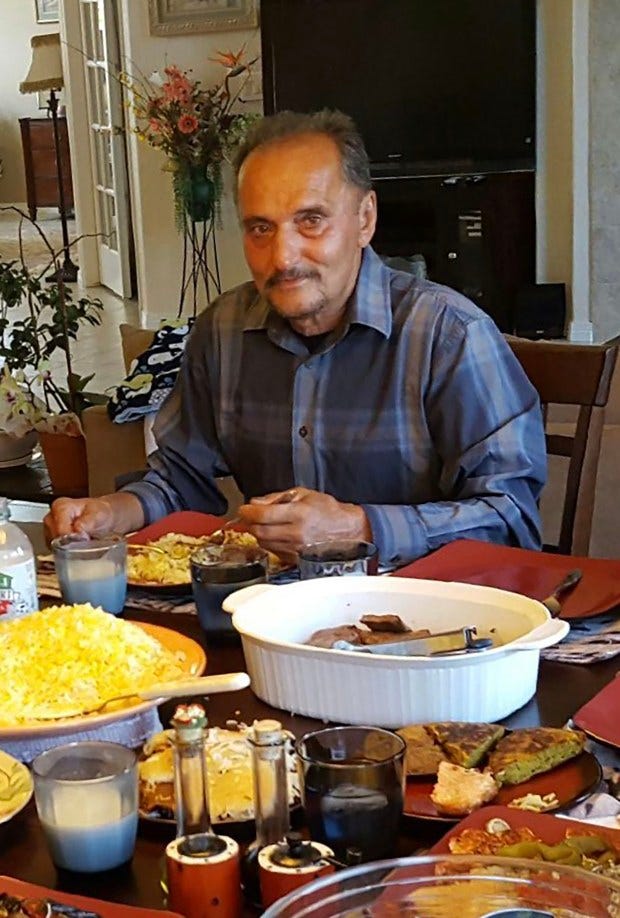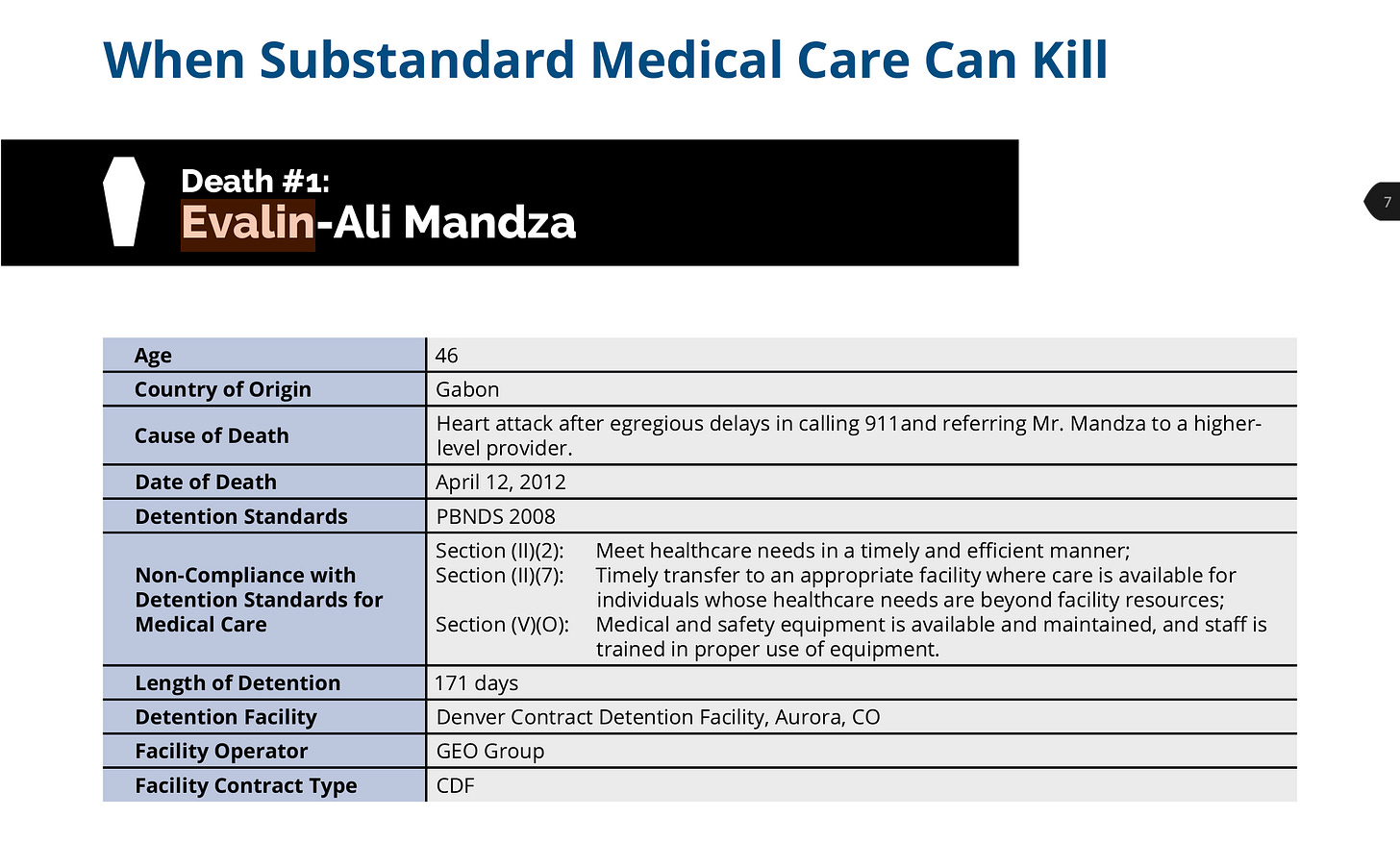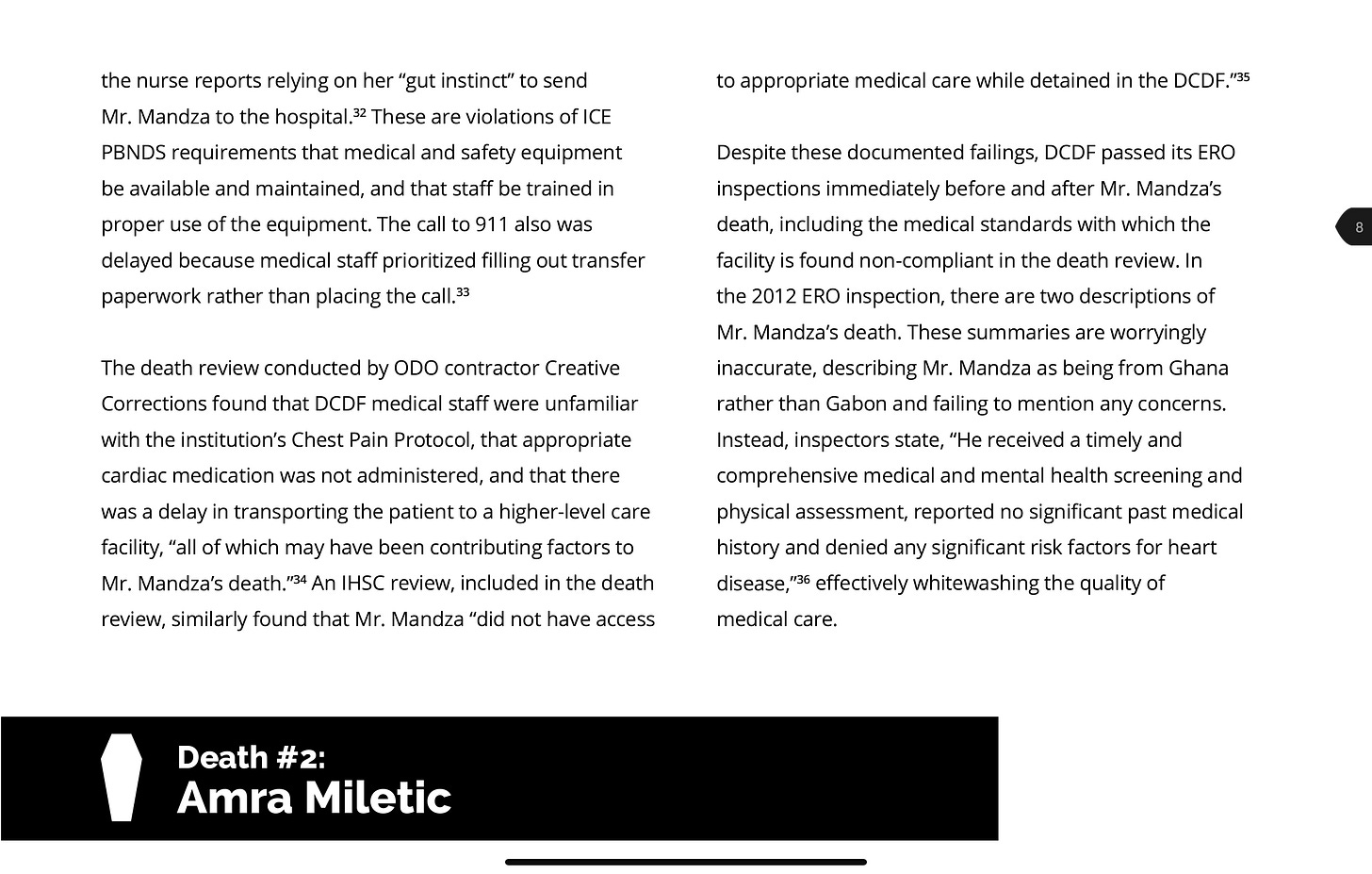The Last Death at Aurora
Why failing to learn from the past dooms us to repeat it. #DetentionKills Transparency Initiative FOIA Journal Vol. 2022-7
Updated Nov. 23, 2022
The last death at Aurora should have been Kamyar Samimi’s:
Photo of Kamyar Samimi provided by his family to Robin Urevich of Capital & Main.1
It wasn’t.
39 year-old Nicaraguan asylum-seeker Melvin Calero Mendoza died at Aurora on October 13, 2022. He left behind two children and many grieving family members. You and/or people you know can join more than a hundred others and support that family here.
Photo of Melvin Calero Mendoza provided to Marissa Armas of CBS Colorado.2
“Samimi fell Ill”
When it announced the passing3 of Kamyar Samimi on December 4, 2017, ICE’s Office of Public Affairs (whose mission we wrote about here4) told the public “Samimi fell ill the morning of Dec 2.”5
An internal Mortality Review Committee impaneled by ICE’s Health Services Corps (IHSC) would later conclude, by December 2, 2017, Mr. Samimi was not just ill. He was seriously ill and getting progressively worse. And he was not getting the care he needed.
ICE withheld the following information about Mr. Samimi’s care from the public when it announced his death on December 4, 2017. ICE has never corrected its 2017 Death Notification.
“Outside the safe limits of practice”
Mr. Samimi’s Mortality Review found his care at Aurora was “delivered outside the safe limits of practice, which either directly or indirectly contributed to his death.”
In other words, detention killed Mr. Samimi.
The Review Committee also identified 25 separate categories of standards violations at Aurora based on its review of his death:
Receiving Screening - Mr. Samimi was not screened as soon as possible upon entering the facility. His medical intake screening was improperly delayed.
Initial Health Assessment - Initial health assessment not done within 2 working or 14 days.180 total initial health assessments past due at Aurora.
Chronic Disease Services - Appropriate practitioners didn’t create a care plan, failed to review labs. Aurora’s physician failed to adjust Mr. Samimi’s care plan despite his suffering. At least 64 people at Aurora had chronic conditions that the Mortality Review Committee could not confirm were being appropriately planned and monitored.
Oral Care - Mr. Samimi wasn’t given a dental screening within 14 days of admission
Continuity and Coordination of Care During Incarceration - During Mr. Samimi’s time locked in Aurora, “there is no evidence supporting a physician’s review of the medical record.” No inter-disciplinary coordination of care. Labs not reviewed by appropriate provider. Treatment plans not initiated or modified as medically indicated. No referral to appropriate facility
Medical Diet and Nutritional Caloric Intake - The responsible provider did not order Mr. Samimi a medical diet. Nobody monitored what he was eating and how it affected his health. Mr. Samimi refused food for over 72 hours but nobody noted it as a hunger strike.
Prescribing continuity medications upon intake into the facility - Incomplete search for medical history which excluded Mr. Samimi’s family. Medical staff failed to offer methadone after disclosing he was on it. Treated for alcohol, rather than opioid withdrawal.
Alcohol and other drug problems - During intake, providers called physician for orders regarding withdrawal symptoms, but physician didn’t make medical entries, assess, or evaluate that condition during detention. Neither medical nor custody staff knew policies or had been trained on withdrawals.
Intoxication and Withdrawal - GEO failed to follow its own policy requiring transfer of people on methadone out of facility. Physician didn’t follow clinic guidelines or justify deviating from them. Physician did not establish protocols for withdrawal. Nursing staff were untrained on withdrawal.
Access to EMS - GEO correctional and medical staff denied Mr. Samimi timely access to emergency medical services (EMS) on December 2 when they delayed calling 911 (instead calling a provider to get a hospital trip approved), and delayed conducting an assessment that would have included initiating CPR. GEO staff were not properly trained on how to respond in an emergency.
Professional Development & Certification - Medical and nursing staff not certified for CPR under the correct program.
Patients with Special Health Needs - GEO medical staff didn’t note Mr. Samimi’s special health needs after his initial assessment or add him to the Significant Detainee Illness list or a Special Needs list. That’s because they didn’t have one.
Basic Mental Health Services - Despite knowing Mr. Samimi was having withdrawals based on an intake screening, MH providers did not elevate his level of care upon learning that he attempted to end his life by suicide on November 28, 2017. GEO “did not provide Mr. Samimi with timely and appropriate access to mental health services.” Providers had him on the wrong withdrawal protocol (alcohol instead of opoids). Behavioral health providers never considered transferring him to a facility where he could get care.
Medical Understaffing - The Aurora facility employed a single physician for 800 detained immigrants. The facility had staffing plan vacancies for an APP, a director of nursing, and two licensed vocational nurses. The facility had no program in place to effectively assess staffing levels and make adjustments.
Medical Autonomy - Aurora’s care was untimely and unsafe. No coordination of care occurred, and the GEO physician did not perform as required under GEO’s contract with ICE.
Policies and Procedures - Aurora staff didn’t know or couldn’t identify the facility’s applicable procedures.
Continuous Quality Improvement (CQI) Program - Despite being required to have a program in place to assess and improve the quality of medical care at Aurora, and despite knowing of systems breakdowns, Aurora had no continuous quality improvement program.
Communication on patients’ health needs - GEO’s medical providers at Aurora failed to communicate Mr. Samimi’s health needs to GEO custody staff and GEO’s facility administrator.
Health training for correctional officers - COs did not get training on identifying people suffering withdrawal symptoms, and they received no training on people with disabilities, health emergencies, or hunger strikes.
Training/education for medical staff - Medical staff were untrained on dealing with patients suffering from withdrawals and those who needed additional assistances due to disabilities. They were also undertrained on responses to emergencies and hunger strikes.
Medication services - Aurora staff did not provide Mr. Samimi medication in a timely manner.
Nursing assessment and documentation - Aurora had no clinical performance process to assess care. The health services authority was absent from day-to-day decision-making about care. Nurses did not perform required duties and document them.
Diagnostic services - Aurora’s physician failed to review diagnostics in a timely manner. GEO medical staff did not conduct clinical testing or labs to assess what Mr. Samimi needed to stay alive.
Medical observation/infirmary care - Infirmary care was not appropriate for Mr. Samimi’s serious medical needs. GEO failed to staff the facility in a manner that could have met medical needs of people inside.
Shift sharps/narcotic counts - Nurses don’t count sharps and narcotics during shift change in keeping with safe community practices.
Questions about Melvin’s death in light of IHSC’s Mortality Review
Did Aurora have adequate medical and correctional staffing at the facility while Melvin was there?
Did medical staff communicate with each other and custody staff about Melvin’s health needs?
Was the emergency response to Melvin’s collapse delayed?
Did physicians and nurses practice and deliver Melvin care within safe limits?
Did GEO and ICE ignore obvious warning signs — like the ones present in Mr. Samimi’s experience?
We have learned too much from ICE’s Mortality Reviews to simply take ICE and GEO at their word. We have seen the evidence that ICE’s public statement in the wake of Melvin’s death, quite simply, false.
“All” people at Aurora do NOT get 24/7 access to medical care. Kamyar Samimi’s case is one example of many demonstrating this fact. But ICE persists in trumpeting it. Because the agency rejects any of the lessons its own medical providers have taught it.
If the answer to any of the five questions above is “yes”, and if any of these failures contributed to Melvin’s death, federal lawmakers and the communities they represent must call on ICE and DHS leadership to cancel its contract with GEO at Aurora. If the agency refuses, Congress should attach an appropriations rider to DHS’s appropriations that forbids the agency from paying federal dollars to put people in Aurora.
Leaving falsehoods unchecked is a form of public impunity
It’s tough to ask the follow-up.
It’s tough to acknowledge the lie as it’s being told.
It’s vital, however, to openly acknowledge and question when ICE and GEO say things in their press responses that aren’t true.
It’s difficult for reporters and lawmakers to ask the follow-up question.
Like:
“Okay. You say you take life and safety seriously, what about Mr. Samimi?
How can you claim that ALL people get 24/7 medical, dental, and mental health care at Aurora when ICE itself concluded the last many who died did not?
Why would you ask us to pretend you did not say that?
Or did you not realize this was the conclusion? And if you didn’t know about the Mortality Findings, what else might to be accurate in your communications about Melvin’s death?
Time is not on our side. Each day without answers is another day death may come for those seeking them.
Only by forcefully investigating and aggressively demanding accountability for people still inside, still at risk, and for Melvin’s family and community can we, together, ensure that Melvin’s is the last death at Aurora.
Update
We were reminded that the last death before the last death at Aurora happened 10 years ago. (3 decades with no deaths and then 3 deaths in ten years. Seems worth considering.)
Here were the conclusions of an ACLU, Detention Watch Network, NIJC report on deaths in custody during the Obama administration:
Robin Urevich, “Daughter Says Detainee Father’s Death Was Preventable,” Capital & Main (Sept. 23, 2019) (available at https://capitalandmain.com/daughter-says-detainee-fathers-painful-death-was-preventable-0923).
Marissa Armas, “Melvin Ariel Calero-Mendoza, Nicaraguan father of 2, dies in ICE custody at Aurora facility,” CBS News Colorado (Oct. 20, 2022) (available at https://www.cbsnews.com/colorado/news/melvin-ariel-calero-mendoza-nicaraguan-father-dies-ice-custody-aurora-facility/).
Samimi ICE Death Notification (available at https://www.documentcloud.org/documents/23315599-ice-samimi-death-release-denver-area-ice-detainee-passes-away-at-local-hospital-dec-4-2017).
“. . . from the moment individuals arrive” #DetentionKills Transparency Initiative FOIA Journal Vol. 2022-4 (available at https://open.substack.com/pub/detentionkills/p/from-the-moment-individuals-arrive?r=1hha63&utm_campaign=post&utm_medium=web)
Samimi Death Notification, https://www.documentcloud.org/documents/23315599-ice-samimi-death-release-denver-area-ice-detainee-passes-away-at-local-hospital-dec-4-2017#document/p2/a2175256










